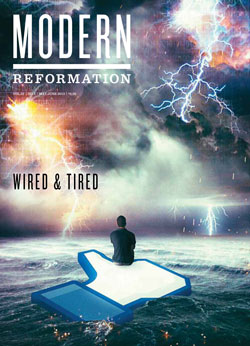
 Modern Reformation’s May-June issue is out! If you haven’t already picked up a copy, this issue, entitled “Wired and Tired,” deals mostly with this our age of technology, and the unexpected weight it has brought to its users. Coming from the angle of identity and authenticity, one of the featured articles comes from yours truly. In it I’m discussing the era of social media, and its connection to the era (my era) of the validated child. For children raised in the 80s and 90s, with destiny- and distinction-talk portioned at the dinner table and decorating public school banners, these same children have become the anxious and validation-hungry curators of a technological selfhood. In other words, technology has created a high-speed conduit for authenticity feedback. To read the whole thing–which you really should do–go no further than here. This article was also the basis for my talk in the 2012 Charlottesville Fall Conference, “The iLife Pursuit,” and for DZ’s talk on social media this spring at Liberate.
Modern Reformation’s May-June issue is out! If you haven’t already picked up a copy, this issue, entitled “Wired and Tired,” deals mostly with this our age of technology, and the unexpected weight it has brought to its users. Coming from the angle of identity and authenticity, one of the featured articles comes from yours truly. In it I’m discussing the era of social media, and its connection to the era (my era) of the validated child. For children raised in the 80s and 90s, with destiny- and distinction-talk portioned at the dinner table and decorating public school banners, these same children have become the anxious and validation-hungry curators of a technological selfhood. In other words, technology has created a high-speed conduit for authenticity feedback. To read the whole thing–which you really should do–go no further than here. This article was also the basis for my talk in the 2012 Charlottesville Fall Conference, “The iLife Pursuit,” and for DZ’s talk on social media this spring at Liberate.
The emphasis on distinction and destiny drove two things into today’s emerging adult: one, the onerous belief in the importance of choice in one’s destiny, and two, the equally onerous need for those choices to be validated at every turn. The product, then, is a tirelessly anxious and affection-hungry generation.
Of course, this distinction theme isn’t a new phenomenon. It has been there in the rugged individualism of the American way (think Whitman’s “Song of Myself,” or Emerson’s “Self-Reliance”), as it has been of modern American Christianity—the talk of journeys and quiet times, discerning God’s perfect plan, true vocation, right moment. Today, though, with the help of technology, distinction for emerging adults has become a 24/7 mission of maintenance. More than just having impressive-sounding majors, or interesting travels to Southeast Asia, or low-paying fellowships in the City, there are immediate, handheld venues for authentic expression. More than ever, the opportunity (and pressure) to self-curate is at our fingertips.
 And yet, to talk about it like an omnipresent weight forgets that it’s fun, too. It feels good to have an experience validated: like getting a compliment, last night’s dinner feels a little bit cooler in retrospect, once you see the images your friend tagged on Instagram with the Earlybird filter. You share some thoughts on your wall about one of them, which your friends “like,” and it feels like, in rehashing the experience, that you’re sharing a new experience all over again. Though it may sound tongue-in-cheek, it feels rewarding to smooth the rough edges, as Marche describes:
And yet, to talk about it like an omnipresent weight forgets that it’s fun, too. It feels good to have an experience validated: like getting a compliment, last night’s dinner feels a little bit cooler in retrospect, once you see the images your friend tagged on Instagram with the Earlybird filter. You share some thoughts on your wall about one of them, which your friends “like,” and it feels like, in rehashing the experience, that you’re sharing a new experience all over again. Though it may sound tongue-in-cheek, it feels rewarding to smooth the rough edges, as Marche describes:
The beauty of Facebook, the source of its power, is that it enables us to be social while sparing us the embarrassing reality of society—the accidental revelations we make at parties, the awkward pauses, the farting and the spilled drinks and the general gaucherie of face-to-face contact. Instead, we have the lovely smoothness of a seemingly social machine. Everything’s so simple: status updates, pictures, your wall…and yet, self-presentation on Facebook is continuous, intensely mediated, and possessed of a phony nonchalance that eliminates even the potential for spontaneity.
While we enjoy the thrill of distinguishing our experiences, the anxiety it generates paralyzes the potential to call any kind of experience “authentic.” This tends to be the root of much of the anxiety of twenty-somethings today: the gap between the curated experience and the real thing. The Facebook user must succumb to the never-ending job of selecting, out of an arresting number of choices, the right choice that makes one “authentic.” Because all forms of social media operate on a continual and instantaneous feedback loop, the human need for validation and is perpetually checked and re-checked, throughout the day, every day.
Author and essayist Walker Percy touched on this need for validation by telling a story about a couple’s search for the “authentic” vacation experience. Going down to Mexico, they want to find an experience that is “it,” that no one else has ever seen, that will serve as a purely distilled capturing of “authentic human experience.” When they find an ancient tribe that seems untouched by modern civilization, they believe they have found “it,” but they also feel a simultaneous dread, that their friend, the anthropologist, might tell them that “it,” in fact, is not genuine. They need their friend, the Expert, the Law, to certify their experience as “authentic.”
The present experience is always measured by a prototype, the “it” of their dreams. “Now I am really living” means that now I am filling the role of sightseer and the sight is living up to the prototype of sights…Hence their anxiety during the encounter. For at any minute something could go wrong.
 This, for Percy, is the “loss of the creature,” that we have shipped off the validation of our authenticity to anyone we believe could be an authority. This is frenetically true of social media—we judge our tweets by their re-tweets, their comments, their likes—and because it is frenetic, the tides of validation are rapidly ebbing and flowing. This floundering validation before the law of authenticity actually kills one’s genuine encounter with an experience.
This, for Percy, is the “loss of the creature,” that we have shipped off the validation of our authenticity to anyone we believe could be an authority. This is frenetically true of social media—we judge our tweets by their re-tweets, their comments, their likes—and because it is frenetic, the tides of validation are rapidly ebbing and flowing. This floundering validation before the law of authenticity actually kills one’s genuine encounter with an experience.

COMMENTS
Leave a Reply












